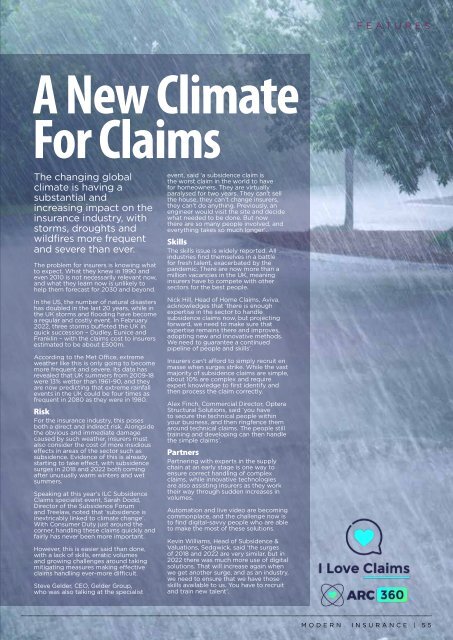Modern Insurance Magazine Issue 60
This issue features... Insight: Every Cloud Has A Silver Lining, by Tim Yeates, Co-Founder, Carbon1 Ltd. Interview: Modelling Modern Risk with Dr Kirsten Mitchell-Wallace, Director of Portfolio Risk Management, Lloyd’s of London Interview: Searching for Answers with Iain Willis, Research Director, Gallagher Research Centre Editorial Board: Find out what our editorial board panel of experts have to say in this edition of Modern Insurance Magazine A Final Word with Steve White, Chief Executive, British Insurance Brokers' Association (BIBA) Is it time for Risk Managers to rethink their role in the Climate Crisis? by François Lanavère, Head of Strategic Partnerships, AXA Climate Associations Assemble: Modern Insurance’s panel of resident associations outline the burning issues in insurance Just a Thought with Eddie Longworth - Building Trust through Responsible AI in Claims: Championing a Voluntary Code of Conduct Making Efficiency Gains in Subsidence Claims, by Chris Carlton MRICS, New Business & Key Account Director, Geobear Chemistry for a Sustainable Future: Q&A with Grant Dempsey, Sales Manager - Distribution, BASF Automotive Refinish UK & Ireland Industry Collaboration: Working together to provide the best mobility solution, with James Roberts, Business Development Director, Insurance, Europcar Mobility Group UK Thinking Upside Down: Mind the Protection Gap, by Ashley Preece, Product Owner, Claim Technology In Conversation with… Neil Garrett, UK, South Africa & Nordics Sales Director, Solera | Audatex A New Climate for Claims, from I Love Claims / ARC 360 10 Mins with… Ola Jacob, Independent Insurance Advisor In Celebration: Modern Claims Awards 2023 Insur.Tech.Talk - Interviews with Stephen Weinstein, Former Chair of the Bermuda Business Development Agency; Bill Churney, President, Extreme Event Solutions, Verisk; Jacqui LeGrand, CEO, Maptycs; Heather H. Wilson, Chief Executive Officer, CLARA Analytics Insur.Tech.Talk Editorial Board - Experts from within the insurtech sector and beyond join us once more to share their unique insights!
This issue features...
Insight: Every Cloud Has A Silver Lining, by Tim Yeates, Co-Founder, Carbon1 Ltd.
Interview: Modelling Modern Risk with Dr Kirsten Mitchell-Wallace, Director of Portfolio Risk Management, Lloyd’s of London
Interview: Searching for Answers with Iain Willis, Research Director, Gallagher Research Centre
Editorial Board: Find out what our editorial board panel of experts have to say in this edition of Modern Insurance Magazine
A Final Word with Steve White, Chief Executive, British Insurance Brokers' Association (BIBA)
Is it time for Risk Managers to rethink their role in the Climate Crisis? by François Lanavère, Head of Strategic Partnerships, AXA Climate
Associations Assemble: Modern Insurance’s panel of resident associations outline the burning issues in insurance
Just a Thought with Eddie Longworth - Building Trust through Responsible AI in Claims: Championing a Voluntary Code of Conduct
Making Efficiency Gains in Subsidence Claims, by Chris Carlton MRICS, New Business & Key Account Director, Geobear
Chemistry for a Sustainable Future: Q&A with Grant Dempsey, Sales Manager - Distribution, BASF Automotive Refinish UK & Ireland
Industry Collaboration: Working together to provide the best mobility solution, with James Roberts, Business Development Director, Insurance, Europcar Mobility Group UK
Thinking Upside Down: Mind the Protection Gap, by Ashley Preece, Product Owner, Claim Technology
In Conversation with… Neil Garrett, UK, South Africa & Nordics Sales Director, Solera | Audatex
A New Climate for Claims, from I Love Claims / ARC 360
10 Mins with… Ola Jacob, Independent Insurance Advisor
In Celebration: Modern Claims Awards 2023
Insur.Tech.Talk - Interviews with Stephen Weinstein, Former Chair of the Bermuda Business Development Agency; Bill Churney, President, Extreme Event Solutions, Verisk; Jacqui LeGrand, CEO, Maptycs; Heather H. Wilson, Chief Executive Officer, CLARA Analytics
Insur.Tech.Talk Editorial Board - Experts from within the insurtech sector and beyond join us once more to share their unique insights!
Create successful ePaper yourself
Turn your PDF publications into a flip-book with our unique Google optimized e-Paper software.
FEATURES<br />
A New Climate<br />
For Claims<br />
The changing global<br />
climate is having a<br />
substantial and<br />
increasing impact on the<br />
insurance industry, with<br />
storms, droughts and<br />
wildfires more frequent<br />
and severe than ever.<br />
The problem for insurers is knowing what<br />
to expect. What they knew in 1990 and<br />
even 2010 is not necessarily relevant now,<br />
and what they learn now is unlikely to<br />
help them forecast for 2030 and beyond.<br />
In the US, the number of natural disasters<br />
has doubled in the last 20 years, while in<br />
the UK storms and flooding have become<br />
a regular and costly event. In February<br />
2022, three storms buffeted the UK in<br />
quick succession – Dudley, Eunice and<br />
Franklin – with the claims cost to insurers<br />
estimated to be about £500m.<br />
According to the Met Office, extreme<br />
weather like this is only going to become<br />
more frequent and severe. Its data has<br />
revealed that UK summers from 2009-18<br />
were 13% wetter than 1961-90, and they<br />
are now predicting that extreme rainfall<br />
events in the UK could be four times as<br />
frequent in 2080 as they were in 1980.<br />
Risk<br />
For the insurance industry, this poses<br />
both a direct and indirect risk. Alongside<br />
the obvious and immediate damage<br />
caused by such weather, insurers must<br />
also consider the cost of more insidious<br />
effects in areas of the sector such as<br />
subsidence. Evidence of this is already<br />
starting to take effect, with subsidence<br />
surges in 2018 and 2022 both coming<br />
after unusually warm winters and wet<br />
summers.<br />
Speaking at this year’s ILC Subsidence<br />
Claims specialist event, Sarah Dodd,<br />
Director of the Subsidence Forum<br />
and Treelaw, noted that ‘subsidence is<br />
inextricably linked to climate change’.<br />
With Consumer Duty just around the<br />
corner, handling these claims quickly and<br />
fairly has never been more important.<br />
However, this is easier said than done,<br />
with a lack of skills, erratic volumes<br />
and growing challenges around taking<br />
mitigating measures making effective<br />
claims handling ever-more difficult.<br />
Steve Gelder, CEO, Gelder Group,<br />
who was also talking at the specialist<br />
event, said ‘a subsidence claim is<br />
the worst claim in the world to have<br />
for homeowners. They are virtually<br />
paralysed for two years. They can’t sell<br />
the house, they can’t change insurers,<br />
they can’t do anything. Previously, an<br />
engineer would visit the site and decide<br />
what needed to be done. But now<br />
there are so many people involved, and<br />
everything takes so much longer’.<br />
Skills<br />
The skills issue is widely reported. All<br />
industries find themselves in a battle<br />
for fresh talent, exacerbated by the<br />
pandemic. There are now more than a<br />
million vacancies in the UK, meaning<br />
insurers have to compete with other<br />
sectors for the best people.<br />
Nick Hill, Head of Home Claims, Aviva,<br />
acknowledges that ‘there is enough<br />
expertise in the sector to handle<br />
subsidence claims now, but projecting<br />
forward, we need to make sure that<br />
expertise remains there and improves,<br />
adopting new and innovative methods.<br />
We need to guarantee a continued<br />
pipeline of people and skills’.<br />
Insurers can’t afford to simply recruit en<br />
masse when surges strike. While the vast<br />
majority of subsidence claims are simple,<br />
about 10% are complex and require<br />
expert knowledge to first identify and<br />
then process the claim correctly.<br />
Alex Finch, Commercial Director, Optera<br />
Structural Solutions, said ‘you have<br />
to secure the technical people within<br />
your business, and then ringfence them<br />
around technical claims. The people still<br />
training and developing can then handle<br />
the simple claims’.<br />
Partners<br />
Partnering with experts in the supply<br />
chain at an early stage is one way to<br />
ensure correct handling of complex<br />
claims, while innovative technologies<br />
are also assisting insurers as they work<br />
their way through sudden increases in<br />
volumes.<br />
Automation and live video are becoming<br />
commonplace, and the challenge now is<br />
to find digital-savvy people who are able<br />
to make the most of these solutions.<br />
Kevin Williams, Head of Subsidence &<br />
Valuations, Sedgwick, said ‘the surges<br />
of 2018 and 2022 are very similar, but in<br />
2022 there was much more use of digital<br />
solutions. That will increase again when<br />
we get another surge, and as an industry,<br />
we need to ensure that we have those<br />
skills available to us. You have to recruit<br />
and train new talent’.<br />
MODERN INSURANCE | 55

















